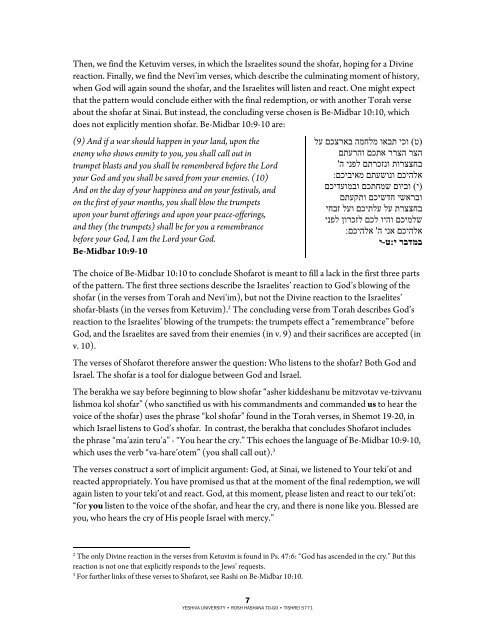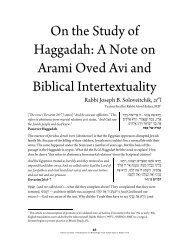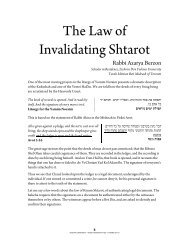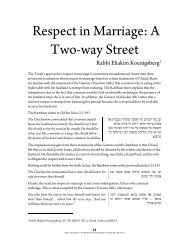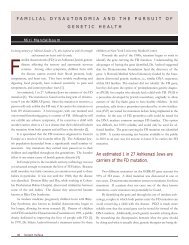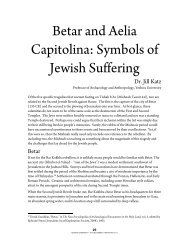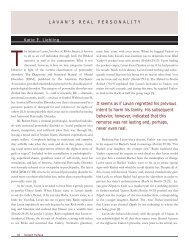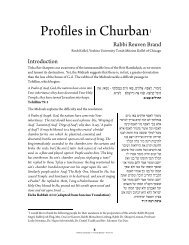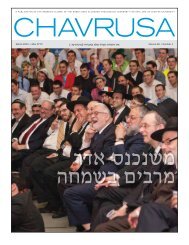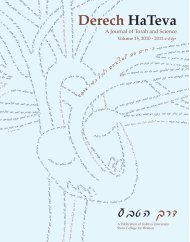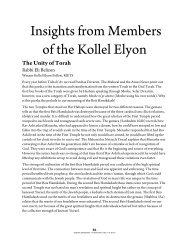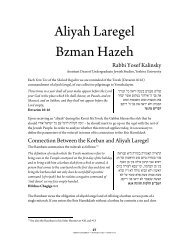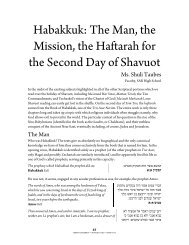YESHIVA UNIVERSITY • ROSH HASHANA TO-GO ... - YUTorah.org
YESHIVA UNIVERSITY • ROSH HASHANA TO-GO ... - YUTorah.org
YESHIVA UNIVERSITY • ROSH HASHANA TO-GO ... - YUTorah.org
You also want an ePaper? Increase the reach of your titles
YUMPU automatically turns print PDFs into web optimized ePapers that Google loves.
Then, we find the Ketuvim verses, in which the Israelites sound the shofar, hoping for a Divine<br />
reaction. Finally, we find the Nevi’im verses, which describe the culminating moment of history,<br />
when God will again sound the shofar, and the Israelites will listen and react. One might expect<br />
that the pattern would conclude either with the final redemption, or with another Torah verse<br />
about the shofar at Sinai. But instead, the concluding verse chosen is Be-Midbar 10:10, which<br />
does not explicitly mention shofar. Be-Midbar 10:9-10 are:<br />
(9) And if a war should happen in your land, upon the<br />
enemy who shows enmity to you, you shall call out in<br />
trumpet blasts and you shall be remembered before the Lord<br />
your God and you shall be saved from your enemies. (10)<br />
And on the day of your happiness and on your festivals, and<br />
on the first of your months, you shall blow the trumpets<br />
upon your burnt offerings and upon your peace-offerings,<br />
and they (the trumpets) shall be for you a remembrance<br />
before your God, I am the Lord your God.<br />
Be-Midbar 10:9-10<br />
7<br />
<strong>YESHIVA</strong> <strong>UNIVERSITY</strong> <strong>•</strong> <strong>ROSH</strong> <strong>HASHANA</strong> <strong>TO</strong>-<strong>GO</strong> <strong>•</strong> TISHREI 5771<br />
לע םכצראב המחלמ ואבת יכו ( ט)<br />
םתערהו םכתא ררצה רצה<br />
'ה<br />
ינפל םתרכזנו תורצצחב<br />
: םכיביאמ םתעשונו םכיהלא<br />
םכידעומבו םכתחמש םויבו ( י)<br />
םתעקתו םכישדח ישארבו<br />
יחבז לעו םכיתלע לע תרצצחב<br />
ינפל ןורכזל םכל ויהו םכימלש<br />
: םכיהלא 'ה<br />
ינא םכיהלא<br />
י-ט:<br />
י רבדמב<br />
The choice of Be-Midbar 10:10 to conclude Shofarot is meant to fill a lack in the first three parts<br />
of the pattern. The first three sections describe the Israelites’ reaction to God’s blowing of the<br />
shofar (in the verses from Torah and Nevi’im), but not the Divine reaction to the Israelites’<br />
shofar-blasts (in the verses from Ketuvim). 2 The concluding verse from Torah describes God’s<br />
reaction to the Israelites’ blowing of the trumpets: the trumpets effect a “remembrance” before<br />
God, and the Israelites are saved from their enemies (in v. 9) and their sacrifices are accepted (in<br />
v. 10).<br />
The verses of Shofarot therefore answer the question: Who listens to the shofar? Both God and<br />
Israel. The shofar is a tool for dialogue between God and Israel.<br />
The berakha we say before beginning to blow shofar “asher kiddeshanu be mitzvotav ve-tzivvanu<br />
lishmoa kol shofar” (who sanctified us with his commandments and commanded us to hear the<br />
voice of the shofar) uses the phrase “kol shofar” found in the Torah verses, in Shemot 19-20, in<br />
which Israel listens to God’s shofar. In contrast, the berakha that concludes Shofarot includes<br />
the phrase “ma’azin teru’a” - “You hear the cry.” This echoes the language of Be-Midbar 10:9-10,<br />
which uses the verb “va-hare’otem” (you shall call out). 3<br />
The verses construct a sort of implicit argument: God, at Sinai, we listened to Your teki’ot and<br />
reacted appropriately. You have promised us that at the moment of the final redemption, we will<br />
again listen to your teki’ot and react. God, at this moment, please listen and react to our teki’ot:<br />
“for you listen to the voice of the shofar, and hear the cry, and there is none like you. Blessed are<br />
you, who hears the cry of His people Israel with mercy.”<br />
2 The only Divine reaction in the verses from Ketuvim is found in Ps. 47:6: “God has ascended in the cry.” But this<br />
reaction is not one that explicitly responds to the Jews’ requests.<br />
3 For further links of these verses to Shofarot, see Rashi on Be-Midbar 10:10.


